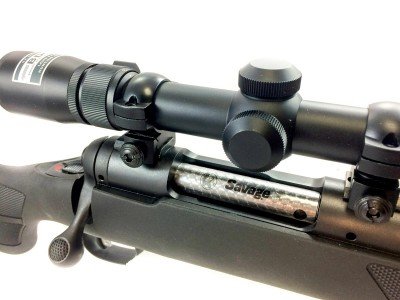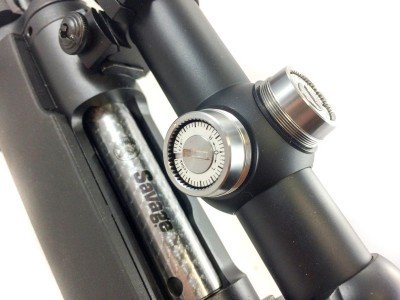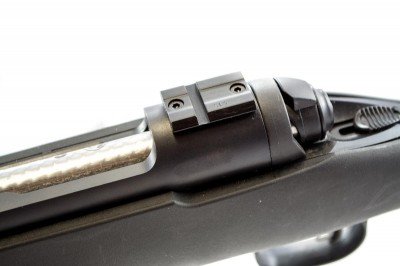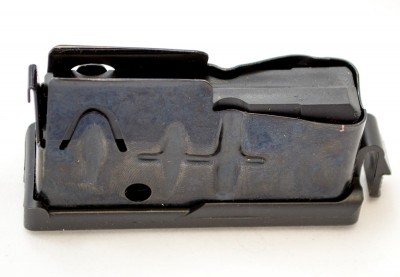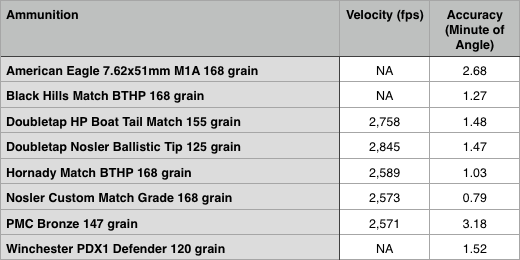[one_half padding=”0 0 0 0px”]
[track-link url=”https://www.savagearms.com/firearms/model/11TROPHYHUNTERXP” campaign=”Savage M-11 Trophy Hunter XP” target=”_blank”]
Savage M-11 Trophy Hunter XP
[/track-link]
[/one_half]
[one_half_last padding=”0 0 0 0px”]
[track-link url=”/Search.aspx?T=savage%20M-11%20trophy%20Hunter” campaign=”Savage M-11 Trophy Hunter XP” target=”_blank”]![]() [/track-link]
[/track-link]
[/one_half_last]

Buy one on GunsAmerica: /Savage M-11 Trophy Hunter XP
Check out Savage’s site: https://www.savagearms.com/firearms/model/11TROPHYHUNTERXP
No matter how you look at it, hunting continues to make gains in participation rates, spending, and popularity. For example:
Between the years of 2006 and 2011, hunting participation soared by nine percent. A big part of that boom was a burgeoning interest in hunting among females. In fact, female hunters were 25 percent more common in 2011 than they were five years earlier. WideOpenSpaces.com
Hunting’s traditional demographic—rural, white males—dwindles every year. Urban hipsters, suburban locavores, homesteaders, and others who have recently come to care (as we always have) where our food comes from will be hunting’s new blood. Field and Stream
Women’s products have increased from 3% to 30% of Bass Pro Shops total sales over the past ten years. Johnny Morris, Owner, Bass Pro Shops.
Hunting-related spending grew 55% in 2011. National Shooting Sports Foundation.

To me, the most interesting underlying observation is the changing demographic. Like shooting sports in general, we’re seeing explosive growth in virtually all demographics except fat white guys. That’s fantastic. The more people from diverse backgrounds we embrace, the better off we all are.
Peeling back one more layer, this influx of new people presents both product and education opportunity for gun manufacturers. How do we help new shooters and hunters tackle the massive learning curves of guns, calibers, and optics? One way is to offer pre-configured, purpose-built rifles. The Savage M-11 Trophy Hunter XP is one great example. Even its name communicates its basic purpose – hunting.
The Savage M-11 Trophy Hunter XP is a ready-to-go hunting solution that helps simplify the learning curve. It comes preconfigured with a bore-sighted Nikon 3-9x optic with a ballistic drop compensation reticle. Take it out of the box, add ammo, and shoot. It couldn’t be easier. But that’s not all; when I say turnkey, I mean it. Of course, the obligatory gun lock is there, but so is a set of earplugs. You’ll also find an NSSF.org pamphlet that provides a brief education on gun safety. Stapled to the inside of the owners manual is a folded target you can use for zeroing the included scope. An Allen wrench tool for scope ring adjustment is there, and last, but not least, an AccuTrigger tool is there to adjust the trigger pull weight.
I recently picked one up to see just how effective this hunting-in-a-box rifle really is.
The Basics
This U.S. market only rifle comes ready to do. When you open the box, you’ll see the scope is already properly mounted. The bolt is shipped in a separate envelope, but that pops right in without the need for tools or instructions.
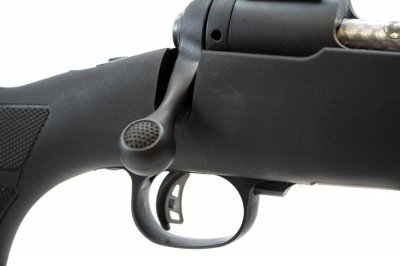 To meet personal preferences and intended use, the Savage M-11 Trophy Hunter is available in numerous calibers. This model can be ordered chambered in your choice of:
To meet personal preferences and intended use, the Savage M-11 Trophy Hunter is available in numerous calibers. This model can be ordered chambered in your choice of:
204 Ruger
22-250 Remington
223 Remington
243 Winchester
25-06 Remington
260 Remington
270 Winchester
270 WSM
30-06 Springfield
300 WSM
308 Winchester
338 Federal
338 Winchester Magnum
6.5 Creedmoor
6.5 x 284 Norma
7MM-08 Remington
Whether your intended game is subterranean pests or one-ton surface dwellers, there’s a caliber for that. I ordered the .308 model as that’s adequate for just about anything in North America, and ammo is easy to find. Besides, I just like .308. This caliber option has a 1:10 twist rate in the barrel. Other calibers may come with different twist rates as appopriate.
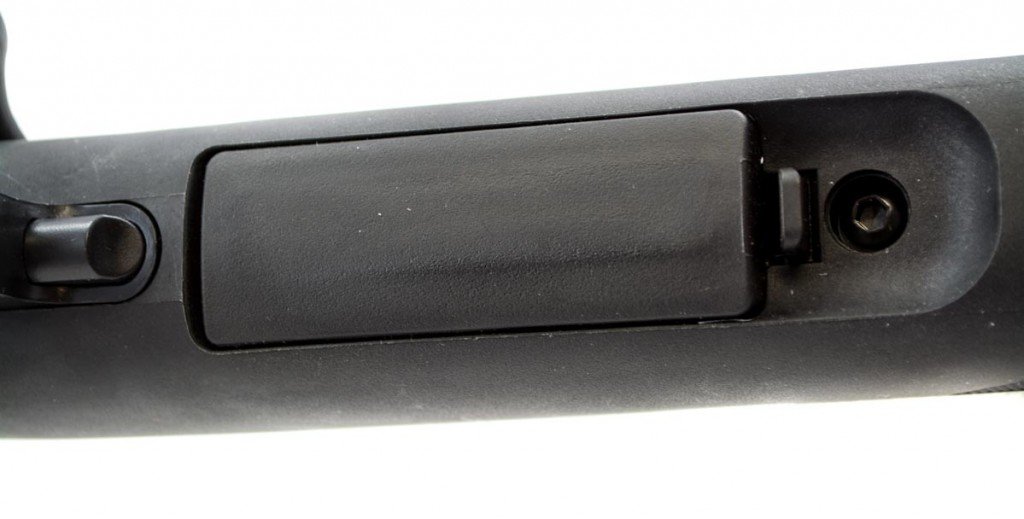
The stock is synthetic with aggressive texturing on both sides of the pistol grip and forend. A soft recoil pad that’s about one-inch thick does a surprisingly good job of dampening recoil on this 7 ¼ pound rifle. The barrel itself is carbon steel with a matte finish, consistent with its intended field use. The action mounts to the stock with a large Allen screws just forward of the magazine and on front and back of the trigger assembly. The barrel is free-floated and I could easily run a business card between stock and barrel all the way back to the receiver, but there’s no easy way to tell isf there is enough clearance to prevent the two from touching during the firing sequence.
[one_half]
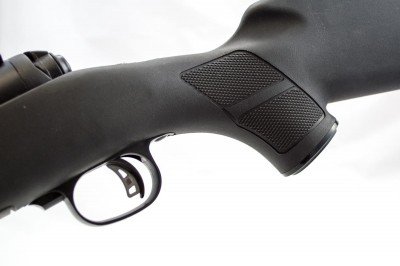
[/one_half]
[one_half_last]
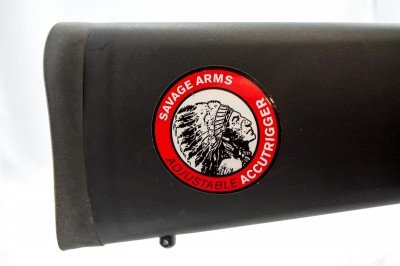
[/one_half_last]
The chamber feeds from a removable box magazine with three-round capacity. Unloading is simple using an inset magazine release lever on the front side – no need to cycle cartridges through the action for a quick unload and no loose magazine parts fly when you release the box magazine.
Overall length is 41.5 inches and the barrel along measures 22 inches. You’ll find two sling attachment points on the stock.
Operation
Safety first, so let’s start there! The teardrop shaped safety slide behind the bolt has three positions. Pulled back towards the shooter, everything is locked – the trigger won’t move and you can’t open the bolt. Move one click forward to the middle position and the trigger is still locked, but you can operate the bolt. Push all the way forward and everything works. There is a red dot that is partially covered in the middle position and completely exposed when the rifle is ready to fire.
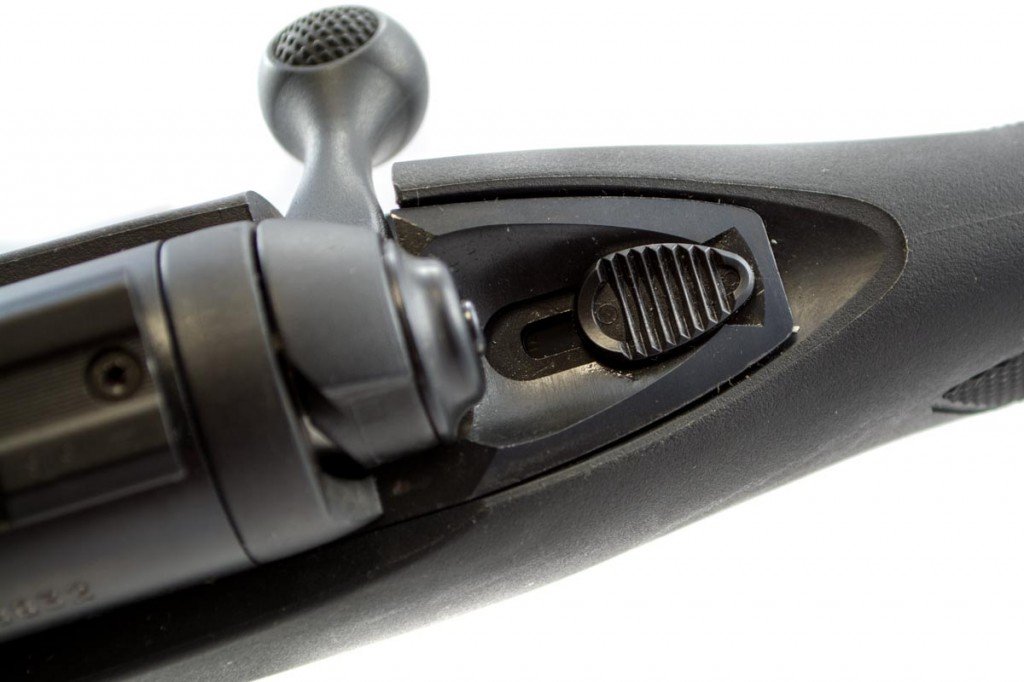
Inserting and removing the bolt for cleaning or travel is a two-handed operation. To insert the bolt, pull the trigger (we’re assuming the gun is empty as the bolt is out!) and press the bolt release button in front of the trigger guard into the trigger guard area. Now the bolt will slide into the receiver. Removing is pretty much the opposite procedure. Make sure the magazine and chamber are unloaded and open the bolt. Now, press the trigger and depress the bolt release. The bolt will now come completely out of the receiver. The two-handed part is that the trigger needs to remain fully depressed while you operate the bolt release. The third hand is for the bolt itself. A bit complicated at first, it becomes simple once you see how the mechanism operates.
[/one_half]
[/one_half_last]
While we’re talking about the bolt, there is a visual and tactile cocked status indicator on the rear of the bolt itself. The bolt cocks when you raise the bolt handle, and you will see a piston move backward (towards you) when you cock the rifle. When you fire, the piston moves forward, leaving a hole in the center of the bolt. It’s easy to see, and you can feel the difference with your finger, just practice this, so you are sure. When cocked, the piston is flush with the back of the bolt, so you really are feeling for the “hole” rather than a protruding piston.
AccuTrigger
The whole point of the AccuTrigger system is to create an adjustable weight trigger with no creep or excess over travel.
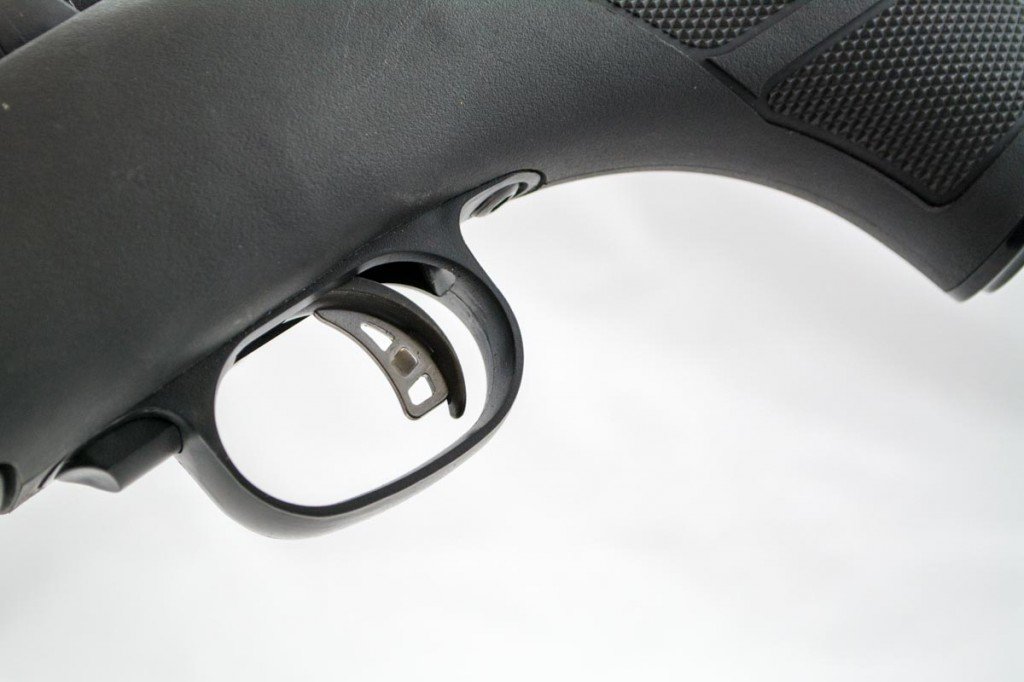
My rifle arrived from the factory with a pull weight of exactly three pounds – every time. There is no detectable creep, and try as I might with my eyes closed and heavy concentration smoke coming out of my ears, I could not detect any over travel after the shot breaks. When you press the trigger, the AccuRelease trigger leaf pulls back about ¼ inch through the face of the trigger. The AccuRelease provides an additional safety mechanism. Unless it’s pressed all the way back, the gun will not fire. Once your finger contacts the trigger face itself, the next thing you feel is a crisp trigger break. That’s it.
One thing to note about the AccuRelease. One of the things I alway try is to move the trigger without engaging the safety leaf. On this rifle, if you press the side of the trigger (and fail to depress the AccuRelease also) the trigger will lock and the firing pin will not move. You’ll hear a click, but that’s not the firing pin moving. From this condition, it’s necessary to recock the bolt to get back to a ready-to-fire status.
[/one_half]
[/one_half_last]
You can easily adjust the pull weight of the AccuTrigger using the included tool. It’s a bit of a delicate operation, so if you aren’t patient, or are particularly clumsy, then you might want to have your gunsmith do it for you. Depending on the specific rifle, you can adjust pull weight from somewhere around two and a half pounds all the way up to six. The owners manual provides detailed instructions and good photos, so be sure you understand the operation first. You’re basically rotating the trigger return spring up and down through a small cylinder, so if you aren’t careful or apply too much muscle, you can butch things up. Since adjusting trigger weight is not something you’ll be doing on a frequent basis, it’s no surprise that you need to remove the receiver from the stock to get at the adjustment control.
The Nikon Optic
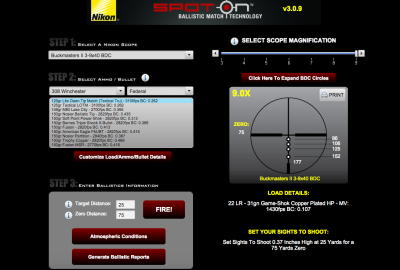
For general purpose hunting, it’s hard to beat a 3-9x variable scope, and that’s what’s included with the Savage M-11 Trophy Hunter XP. This one features a 40mm objective lens on a one-inch tube. Eye relief is just about 3 ½ inches – plenty to avoid that embarrassing half moon cut on your brow when shooting larger calibers.
I liked shooting this at the lowest 3x zoom setting until I really needed to get precise at distance. The field of view at 3x magnification and 100 yards is about 35 feet and you can easily shoot with both eyes open on the lower power settings.
The windage and elevation dials are covered as the ballistic drop reticle is designed for a holdover approach for different ranges rather than dialing clicks to compensate for bullet drop. Once the caps are removed, you can adjust for windage and elevation with ¼-inch movement per click at 100 yards.
The reticle is fast and simple. It’s in the second focal plane so reticle size does not change with zoom level. Keep in mind that the ballistic drop compensation indicators will only be accurate at the 9x zoom level.
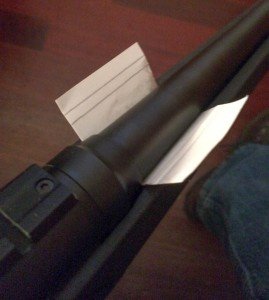
The reticle uses a simplified ballistic drop compensation model. The idea is to adjust the zero, so the center crosshairs so point of impact matches at 100 yards. Then, the four circles below that indicate hold points for 200, 300, 400, and 500 yards accordingly. This will get you close when using standard velocity cartridges in the 2,800 feet per second range. If using magnum velocity cartridges in the 3,000 fps range, zero at 200 yards, then each circle represents a 100-yard increment out to 600.
Clearly this is an estimate as every cartridge and bullet combination has a different flight path. To find the exact yardages for each circle in your rifle, you can visit the Nikon website and use their Spot On Ballistic Match tool. Just enter your ammo and average environmental details and the tool will tell you exact yardages for each of the hold points.
For an entry level package rifle, I really like this approach. No minutes of angle or milliradians and all the complicated math. Pick you ammo from the online calculator and you know exactly how many yards correspond to each aiming circle.
Shooting and Accuracy testing
This is a nice handling rifle. For me, the optic height was right in line with my default mounting position while standing. If I wanted to add a shell carrier or cheek pad I would make sure it’s a think one or else my line of sight would be too high for the optic. Unless you want a shell carrier, there’s not much need for a cheek pad (in the .308 model at least) as recoil is very manageable. The factory recoil pad is very effective at dampening recoil. This is not a rifle I would mind shooting throughout an afternoon.
Step one for accuracy testing a new rifle is zeroing the scope. My sample rifle came bore-sighted right out of the box, and was pretty darn close before I made the first adjustment. I took some shots using a 147 grain .308 hand load and found initial points of impact to be just a couple inches high and a couple more to the right at 100 yards. That’s well within variance between different types of ammo, so you might say the rifle and Nikon scope were pre-sighted out of the box. By no means am I recommending skipping the zeroing step, you’ll always want to do that to be sure the point of aim and point of impact for your specific ammo are what you expect.
[one_half]
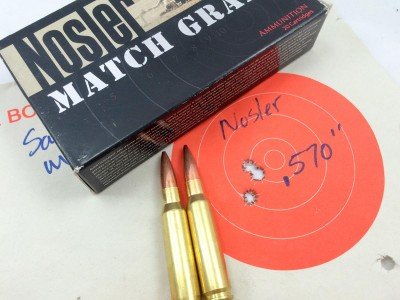
[/one_half]
[one_half_last]
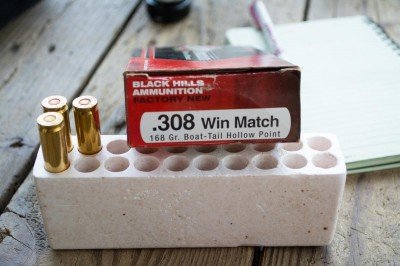
[/one_half_last]
I shot for accuracy on a couple of different days. The first outing I shot at a distance of 100 yards. Conditions were great and the wind was light so I was not worried about any significant artificial influences on measured accuracy performance. Th second outing was a bit more challenging. With gusty winds over 20 mph, I decided to move the targets in close and convert group size to minutes of angle to account for my close range. Even at just 100 yards, a 20 mph crosswind can throw lateral point of impact off by over an inch, and that would certainly render any group measurements meaningless. For these conditions, I brought the targets in close to 25 yards and converted inches to minutes of angle. For example, a ½ inch group at 25 yards translates to a two inch group at 100.
[one_half]
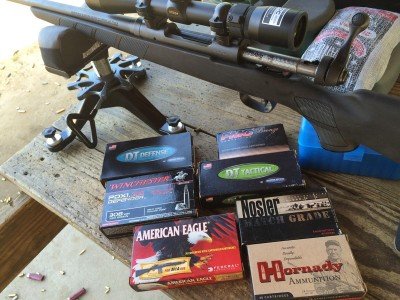
[/one_half]
[one_half_last]
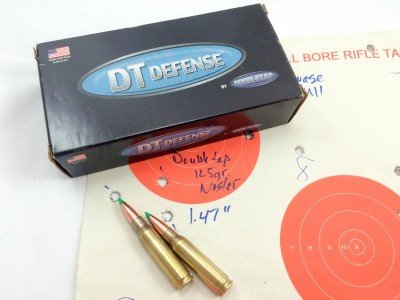
[/one_half_last]
As this rifle is a svelte-barreled hunter, I measured three-shot groups. I figured that would be a decent representation of its performance in the field. Unless you plan to miss a whole lot, it’s unlikely that this rifle would have to deliver enough rounds to cook bacon on a red-hot, smoking barrel.
Here’s what I measured after average out the results from two different shooting outings with each type of ammo.
Closing Arguments
I was keen to test this particular model as I’ve had wonderful success with an older Savage .22-250. As an intended high-volume varminter, it has a heavy bull barrel so is not a direct comparison. Nonetheless, I’ve found it to be a reliable tack driver.
The Savage M-11 Trophy Hunter didn’t disappoint either. Considering the price point and the fact that it’s a lightweight hunting package rifle, I was pleased with its one minute of angle performance. I didn’t even do too much experimenting with ammo and am confident that with a little hand load tinkering, I could get even smaller groups.
While it has the features that hunters with most any experience level will appreciate, it’s well suited for beginners as it’s just about ready to go out of the box. I especially appreciated the ease of first time zeroing which was clearly a result of careful bore sighting at the factory. I’ve seen far too many new shooters struggle to get shots on paper at 50 or 100 yards with a newly mounted scope, so to me, this was a nice “attention to detail” feature.
Manufacturer’s Suggested Retail price is $629.00, but I’m seeing them here on GunsAmerica for about $539.00, and that includes the Nikon 3-9x variable optic.
